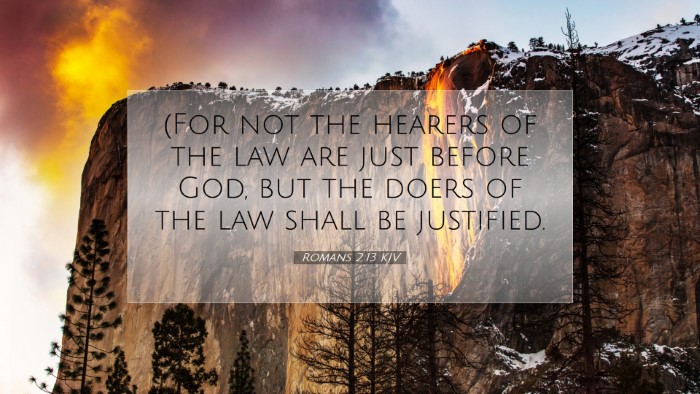Commentary on Romans 2:13
Verse Text: "For it is not the hearers of the law who are righteous before God, but the doers of the law who will be justified."
Introduction
This verse from Paul's epistle to the Romans encapsulates critical themes in Pauline theology regarding the Law, righteousness, and justification. It serves as an essential counterpart to the arguments against Jewish complacency in the belief that their privileged position grants them automatic justification before God. This commentary synthesizes insights from established public domain commentaries, providing a thorough exploration of the verse's meaning and implications for believers.
Contextual Analysis
In Romans Chapter 2, Paul addresses both Jews and Gentiles, highlighting the dangers of mere formal adherence to the Law. Matthew Henry emphasizes that knowledge of the Law does not suffice for righteousness; it requires action—an obedience that flows from faith and love.
1. The Nature of Righteousness
Henry's commentary explains that true righteousness in the sight of God goes beyond mental assent or oral confession. Albert Barnes strongly affirms that the essence of this righteousness is found in obedience to God's commands, serving as an expression of an individual's faith. Clarke similarly notes that righteousness can only be authentically exhibited through action, which is rooted in the transformative power of God's grace.
2. The Role of the Law
Paul's argument asserts that the Law holds intrinsic value, yet its purpose is misinterpreted when individuals rely solely on knowledge without corresponding action. Barnes clarifies that the Law was intended as a guide and not merely a set of rules to abide by unceremoniously. Adam Clarke adds that genuine observance of the Law arises from an internal change of heart, aligning with God’s desire as revealed in Scripture.
Theological Implications
1. The Principle of Justification
This verse introduces a critical judicial principle: justification comes through doing rather than mere hearing. Henry expands on this by stating that justification is not a merit-based system; rather, it encapsulates a divine acknowledgment of a believer's faith manifested through works. This reflects James 2:17, where faith without works is described as dead.
2. Accountability Before God
Romans 2:13 underscores a universal accountability to God's standards. Clarke emphasizes that both Jews and Gentiles are equally evaluated by their adherence to God's truths, thus demolishing any notion of ethnic superiority in spiritual matters. Barnes reiterates this view, arguing that God’s judgment will be impartial, taking neither race nor religious affiliation into account but rather the sincerity of one's heart and actions.
Practical Applications
- Living Out Faith: Believers are called to integrate their faith and actions; mere knowledge is insufficient. This challenges individuals to reflect on their spiritual practices and strive for authenticity in their walk with God.
- Engagement with the Word: This passage motivates believers to engage deeply with Scripture, internalizing it to transform their lives into embodiments of God's commands rather than superficial observers.
- Righteousness Defined by Action: The call to action redefines righteousness in a community context, urging believers to demonstrate their faith through service, love, and compassion toward others.
Conclusion
Romans 2:13 serves as a pivotal reminder that the Christian faith is demonstrated through lived experiences rather than mere intellectual belief. By drawing from the insights of Henry, Barnes, and Clarke, this commentary underscores the importance of being 'doers of the law'—actively engaging with God's commands as a true testament of faith. This verse challenges congregations and individual believers alike to pursue an authentic discipleship that is reflected in daily actions, thereby fulfilling the righteous expectations of God.


